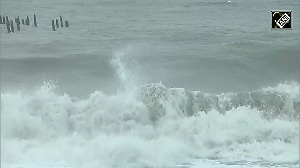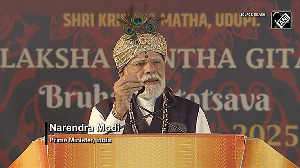The high-powered US Congressional delegation led by House Speaker Nancy Pelosi that visited India last month and met Prime Minister Manmohan Singh and other senior officials, has made it clear that it is the Hyde Act and not the 123 Agreement that is binding on the Indo-US civilian nuclear agreement that now remains stalled in New Delhi.
Congressman Ed Markey, co-chair of the Congressional Task Force on Non-proliferation, who was among the members of the delegation, buttonholed by rediff.com after a Capitol Hill media conference by Pelosi and the delegation on their trip to India, said, the delegation had "raised the Hyde Act and the requirement in the Hyde Act that nuclear fuel and equipment be returned to the United States in the event that India detonated another nuclear bomb."
Markey, a strong critic of the Indo-US deal and is also chairman of the House Select Committee on Energy Dependence and Global Warming, noted, "And, that was the subject that is obviously in debate between the ruling party and its ruling coalition, including the Communists in the country."
The Massachusetts Democrat reiterated, "So what I did was just to raise for them what the law of the United States is with regard to the impact that a nuclear explosion would have since the section, which is being amended is the Section 123 of the Atomic Energy Act and the Non-proliferation act of 1978, and obviously the Hyde Act amends that to make it possible for have a transaction with India."
Markey said that while the delegation was in India, the debate continued to rage 'inside India as to whether or not -- the Hyde Act was the final arbiter'.
The delegation had impressed upon all Indian officials and parliamentarians that India has to abide by the provisions of the Hyde Act, he added.
He said the delegation had pointed out to the Indian officials and parliamentarians that US Secretary of State Condoleezza Rice had assured the US Congress that 'the Bush Administration intends on abiding by the Hyde Act and we made it clear that the Hyde Act was the law of the United States when we were there -- when we were speaking with all of the various groups that we met with."
Asked if there was an appreciation by Dr Singh and his senior Cabinet colleagues and others that it was the Hyde Act that superseded the 123 Agreement, Markey said: "I hope so. The discussion turned exclusively while we were there on the Hyde Act -- that was the discussion. And, whether or not, the Hyde Act was binding upon the President of the United States, which we assured them, it was."
"Then in different instances, debates broke out amongst Congress people as to whether or not, and as a result whether it would be a good idea to accept the agreement or not. But, we were there in a way that helped clarify what American law was -- what the exception to the Section 123 of the Atomic Energy Act represented."
Markey said it was now 'up to the Indian government to decide whether or not they wanted to accept that agreement'.
Earlier, Pelosi said that in terms of the nuclear deal, "The question is, how much does India want the treaty? We have the Hyde Amendment, and they had some objections to that. But I think we had a frank and open discussion."
Pelosi said, "They are engaged in their own internal political debate on the subject, and only once it is resolved and the agreement comes back to Congress that lawmakers can decide on how to vote on the deal."





